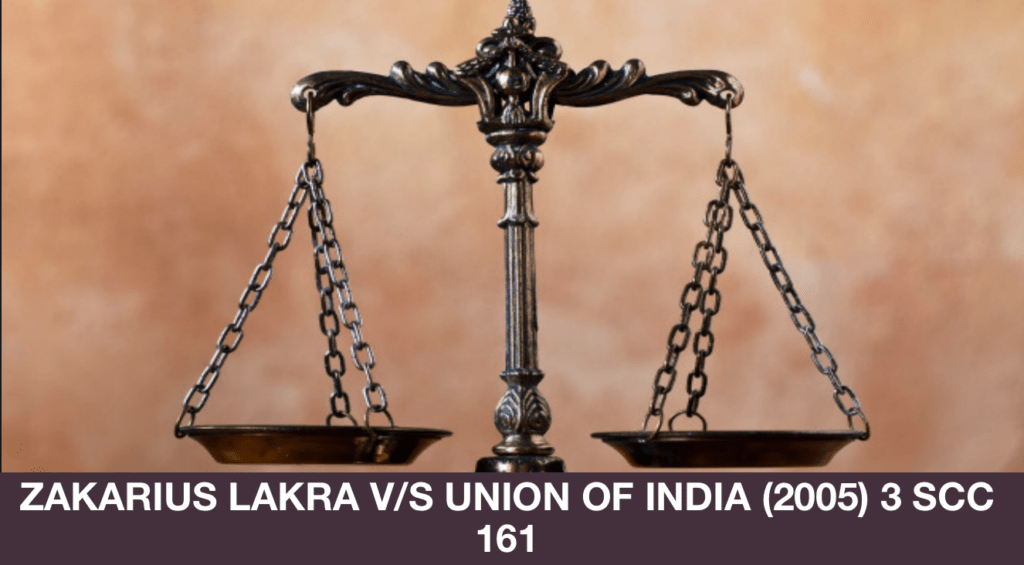
Citation: (2005) 3 SCC 161
Date of Judgement: 16th February, 2005
Court: Supreme Court of India
Case type: Criminal Appeal no. 824 of 2002
Appellant: Zakarius Lakra
Respondent: Union of India
Bench: P. Venkatarama Reddi and A. K. Mathur
FACTS OF THE CASE:
The Additional Sessions Judge, Dehradun imposed death sentence on the accused-appellant which was later confirmed by the High Court and further upheld by the Supreme Court on the reference to the appeal filed by appellant.
The petitioners, who are the parents of the accused-appellant, filed a Writ Petition under Article 32 of the Constitution, questioning the legality of the death sentence imposed on the appellant stating that he was a juvenile on the date of commission of the offence.
ISSUES:
- Whether the death sentence imposed on the client can be reduced to Life Imprisonment on the grounds that the accused was a juvenile at the time of the commission of offence?
ARGUMENTS:
The learned counsel for the petitioners overtly stated that they did not seek for the re-opening of the trial or the setting aside of conviction, but only for the modification of death sentence to life-imprisonment with regards to the relevant date.
It was revealed that along with the memorandum of appeal, the appellant had filed two certificates dated 28.04.2001 and 02.08.2002 issued by the school authorities in West Bengal but they were not brought to the notice of the Bench at the time of hearing of the appeal and therefore, it is on the basis of this material that the learned counsel for the petitioners submitted that the imposition of death sentence was not proper.
According to the school certificate produced as additional evidence along with the writ petition, the petitioners prayed for quashing the death sentence on the ground that the accused was a juvenile at the time of the commencement of the offence.
The learned counsel for the petitioners referred to the decisions of the Supreme Court in Raj Singh v. State of Haryana and Gopinath Gosh v. State of Bengal, 1984 (Supp) SCC 228 wherein the plea of the offender being juvenile was entertained for the first time in this Court and appropriate relief was given thereon.
The learned counsel had also drawn attention to the observations made in Ramdeo Chauhan v. State of Assam wherein Thomas, J. in his dissenting opinion observed that “the interdict contained in Section 22(1) of the Juvenile Act cannot be bypassed for awarding death penalty to the petitioner so long as the death penalty is permitted to survive Article 21 only if the lesser alternative can be foreclosed unquestionably. In other words, if the age of the petitioner cannot be held to be unquestionably above 16 on the relevant date its corollary is that the lesser sentence also cannot unquestionably be foreclosed. We have to abide by the declaration of law made by the majority of Judges of the Constitution Bench in Bachan Singh case.
For the aforesaid reasons I am persuaded to allow this review petition and alter the sentence of death to imprisonment for life.”
The aforementioned case arose out of the review petition filed by the accused-appellant.
JUDGEMENT:
The contention regarding the age of the accused arose as it was claimed that he was a juvenile at the time of commission of crime i.e., 15.11.1994 because he gave the age as 20 years in his as statement recorded under Section 313 of Cr.P.C. on 7.3.2001.
The High Court had noted that the accused had opened a bank account with the Punjab National Bank at Dehradun on 9.3.1994 and hence the Court observed that the accused would not have been in a position to do so unless he had either declared himself as a major or was one. The passbook and cheque book were also exhibited in the trial.
The same view was also taken by the Trial Court and the Supreme Court found that this aspect of consideration was correct and conclusion was reached at.
The Supreme Court also mentioned that the relief sought by the accused cannot be granted by way of Writ petition under Article 32. The appropriate remedy was to file a curative petition as this Court had mentioned in its decision of Rupa Ashok Hurra v. Ashok Hurra.
The Writ petition was hence dismissed with the remedy left open to the petitioners to convert the present petition into a curative petition by making necessary amendments and following of the due procedures.
REFERENCES:
https://indiankanoon.org/doc/1340518/
Written by Tanisha Singh an intern under legal vidhiya.




0 Comments